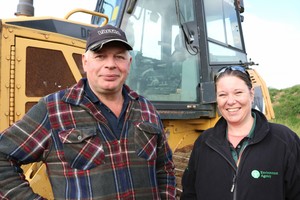Have your say about how flooding impacts the local Weardale community
Informal drop-in events will take place this month

Contractor John Carrick and the Environment Agency's Kirsty Hardy
September is a great month to catch up with how things are going with one of the country’s leading landmark flood alleviation projects that is being delivered in the North East of England on our very doorstep.
The £2.1million Weardale Natural Flood Management (NFM) Demonstrator project has long term ambitions to deliver natural features across an 100km2 area of landscape that will hopefully reduce the risk of flooding for around 140 properties, encourage carbon capture, improve water quality, and create a haven for wildlife to thrive.
This month the Environment Agency will be hosting three information events across successive days at Cowshill & Lanehead Village Hall, Stanhope Community Centre and Westgate Village Hall in County Durham (the full event details are listed below).
The idea of the informal events is to capture local knowledge of how flooding affects the residents and business owners of Weardale. It will also give the team a chance to chat with residents about the Natural Flood Management project and find out how it is progressing.
The project covers Stanhope Burn, Rookhope Burn, Killhope Burn, Ireshopeburn and Middlehope Burn in rural County Durham.
The Weardale Natural Flood Management Demonstrator is part of a national Defra funded natural flood management project.
Mr John Carrick, a local landowner and agricultural contractor talks about the importance of the flood alleviation project and why the community should be getting involved in the programme. He said:
An issue like flooding is in the public interest and can affect anybody. The events are a good way for residents to find out the intentions of the Environment Agency and what this scheme will mean for the local community.
I think where Government money is being spent residents should know what’s going on in their region and learn about what the project is all about.
As a landowner Mr Carrick explains why he feels it’s important to play a role in the NFM Demonstrator project. He said:
The project gives the landowner a chance to do some good in the water catchment by retaining water to prevent flooding downstream in periods of heavy rain, as we live in a very high risk rainfall area.
Kirsty Hardy, Flood and Coastal Risk Management Advisor at the Environment Agency, said:
Our project is looking at how NFM could reduce flood risk in several locations across Weardale and to assess what this could mean to the local communities.
We are working with landowners within the area to install features that will retain and temporarily hold back water.
Just to put things into context, the water we are looking to hold back is the equivalent of one-hundred Olympic sized swimming pools, which is a great deal of potential flood water that could impact upon residents and businesses.
The reason for installing NFM features and introducing the scheme is to hopefully prevent the water entering the water course, which could in turn decrease flood risk downstream. If successful the project could show that natural flood management has the ability to reduce flood risk for local towns and villages.
The project is supported by Forestry Commission England, Natural England and North Pennines Area of Outstanding Natural Beauty Partnership.
The community information drop-in events are as follows:
Tuesday 24 Sept / Cowshill & Lanehead Village Hall / County Durham, DL13 1DA 2.30pm–7pm
Wednesday 25 Sept / Stanhope Community Centre / 11 Front Street, Stanhope, County Durham, DL13 2NQ 2.30pm–7pm
Thursday 26 Sept / Westgate Village Hall / Front Street, Westgate, County Durham, DL13 1RX 2.30pm–7pm
For further details about the community information events or the Weardale NFM Demonstrator project, please contact Kirsty Hardy at the Environment Agency, by emailing: Kirsty.Hardy@environment-agency.gov.uk
People can also learn more about the regional and national work of the Environment Agency by visiting www.gov.uk/environment-agency